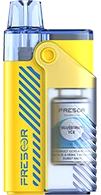New UK Government Supports Vaping - Vape Market Express

9 July 2024
1. New UK Government Supports Vaping

Following the election, the Labour Party has formed the new government, with Prime Minister Keir Starmer appointing ministers who will influence vaping policy. The government's Chief Scientific Adviser, Professor Angela McLean, remains in position. The Labour Party plans to support the Tobacco and Vaping Bill, which includes:
- Restricting vape flavors to mint, menthol, tobacco, and "fruit."
- Imposing limits on packaging design and labeling.
- Regulating the display of vapes in stores.
- Banning free samples for individuals under 18.
- Pledging to ban disposable vapes.
The Labour Party has not yet commented on the proposed taxation for vaping products.
Comment
The Labour Party's backing of the Tobacco and Vaping Bill signals a robust move towards regulating vaping in the UK. Their focus on flavor restrictions, packaging rules, and banning disposable vapes underscores a commitment to public health and youth protection. However, details on vaping product taxation remain to be addressed, highlighting a key area for future policy development and industry impact assessment.
2. German Vaping Association Opposes Menthol Ban
Since spring 2024, the BMEL has been reviewing the menthol ban in vapes. To implement such a ban under Section 13 (2) of the TabakerzG, it must be shown that menthol in liquids poses a foreseeable health risk. The VdeH argues that the scientific and legal grounds for a menthol ban are insufficient. Using menthol in vapes does not pose a significant health risk that would justify a ban.
Detailed points include:
Menthol in vape liquids is safe: The WHO confirmed in 2019 that the acceptable daily intake (ADI) for menthol is 4 mg per kg of body weight. For a 70 kg adult, a daily intake of 280 mg of menthol is considered safe, even with lifelong use. This amount is comparable to consuming about 15 cough drops or mint gums, posing no health risk to consumers.
Menthol does not enhance inhalation or increase nicotine absorption: Vaping does not produce combustion byproducts that irritate airways or cause coughing, which might need masking with additives. In 2015, the BfR assessed that menthol in vapes has minimal relevance for facilitating inhalation. Clinical studies found no evidence that menthol increases nicotine absorption. Professor Mayer from the University of Graz reported that using menthol could actually reduce the required nicotine concentration in liquids.
A menthol ban is disadvantageous for German manufacturers, retailers, and consumers: No EU member state has specific bans on menthol. Most EU countries do not restrict vape liquid flavors. This unique stance will severely impact German manufacturers, retailers, and consumers, making up to 80% of vape liquids unsellable. The EU Commission is preparing to revise the Tobacco Products Directive, aiming for more coordinated regulation of vape ingredients. The German government should advocate for unified internal market regulation to ensure high consumer protection and fair competition rather than unnecessarily restricting the free movement of goods within the EU with a national menthol ban.
Note: The German Federal Ministry of Food and Agriculture (BMEL) is a federal ministry headquartered in Bonn, with a second office in Berlin.
Comment:
The German Vaping Association's opposition to the menthol ban underscores ongoing industry concerns about regulatory overreach. Their argument that menthol in vape liquids poses minimal health risks and may even aid nicotine reduction challenges the necessity of such stringent measures. This debate highlights the complexities of balancing public health objectives with industry interests and scientific evidence.
3. Surge in High-Nicotine Vaping in the UK
Many ex-smokers state that high-nicotine vapes are crucial for quitting smoking. Meanwhile, the UK is considering higher taxes on high-nicotine vape products. A new study found a significant increase in the use of high-nicotine vapes in the UK. The study, conducted by University College London (UCL) and published in the journal Addiction, surveyed 7,314 adult vapers in England between July 2016 and January 2024, examining changes in the nicotine content they used. The study showed a sharp rise in the number of people using vape liquids with nicotine content reaching or exceeding the UK's legal maximum of 20 mg/ml.
4. New Zealand Considers Smokeless Tobacco for Harm Reduction
The Coalition of Asia Pacific Tobacco Harm Reduction Advocates (CAPHRA) strongly encourages the New Zealand government to legalize snus and smokeless tobacco as part of its tobacco harm reduction strategy. These products have proven effective in reducing smoking rates in Scandinavian countries, particularly Sweden and Norway, which currently have the lowest smoking rates in Europe. These products provide smokers with a less harmful cigarette alternative and could significantly accelerate New Zealand's progress towards a smoke-free goal. Evidence from Sweden and Norway clearly shows that snus and nicotine pouches can substantially reduce smoking rates without leading to widespread use among youth. CAPHRA urges the government to base its policies on evidence rather than unfounded fears. Legalizing and appropriately regulating smokeless tobacco products will provide New Zealand smokers with more cessation tools, potentially saving thousands of lives. CAPHRA calls on Minister Costello and the government to advance the legalization of snus and smokeless tobacco while implementing proper regulations to prevent youth access and ensure product quality and safety.
- Sweden: Smoking rates have significantly declined over the past decades. In the 1960s, nearly half of Swedish men smoked. By 2022, only 5.6% of Swedish adults smoked, mainly due to the widespread use of snus and, more recently, nicotine pouches.
- Norway: Smoking rates have also dramatically declined, especially among youth. In 2021, only 1% of Norwegians aged 16-24 smoked daily, demonstrating the effectiveness of nicotine products like snus in reducing youth smoking rates.
The Coalition of Asia Pacific Tobacco Harm Reduction Advocates (CAPHRA) is a regional alliance of consumer tobacco harm reduction advocacy organizations. Its mission is to educate, advocate, and represent the rights of adult alternative nicotine consumers to access and use harm reduction products. CAPHRA states it will continue to protect consumers' rights in the Asia Pacific region, enabling them to access and use evidence-based, regulated, and well-marketed harm reduction products to mitigate the devastating impact of smoking-related diseases: "We encourage further research, public dialogue, and collaboration with governments, health organizations, and stakeholders to ensure the best outcomes for public health."
5. Polish Government Yet to Decide on Disposable Vape Ban
An alternative idea has emerged on the government website 123rf: restricting the sale of disposable vapes rather than imposing a total ban. Last year, over 100 million "disposables" were sold. In February, the health ministry announced plans to completely ban sales by summer. However, no ban has been imposed; instead, the health ministry has raised the legal age for purchasing these products.
The health minister stated: "We hope to fully ban the sale of disposable vapes from autumn. This ban is important because the government intends to implement the EU directive prohibiting flavored (mainly menthol) heated tobacco inserts." Over 90% of disposable vapes sold in Poland have fruity, beverage, or sweet flavors. Most contain nicotine and almost all are imported from China, where the sale of such vapes is banned due to their potential attraction to children.

























